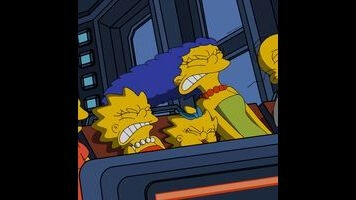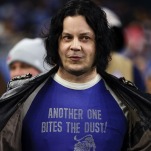It would be a lot easier to make the case that The Simpsons still has value if the people behind the show seemed to give a damn. But an episode like “The Man Who Came To Be Dinner” is a product of such slapdash, breezy disregard for what makes The Simpsons The Simpsons that it functions as a dispiriting signpost to the show’s hastening irrelevance.
Throughout its 26th season, the show has, following the pattern of the last decade or so, marched along in sluggish competence. There are real downers (“Clown In The Dumps”), an occasional episode whose modest charms seem to come from an earlier, better season (“Super Franchise Me”), and the rest coast along on familiarity and the cast’s talent. But there have been worrying signs this season that showrunner Al Jean (who co-wrote this episode alongside David Mirkin) is embracing an “anything goes” philosophy for the show that’s less about taking risks than it is about just throwing any old joke out there, regardless of how it impacts the characters, the show’s world, or The Simpsons’ legacy. The tonal nightmare that was the Family Guy crossover was technically not a Simpsons episode, but it still happened, cheapening the Simpsons’ brand with an infection of Family Guy’s lazy cruelty. The theoretically more palatable Futurama crossover was a disappointment as well, not least because of how perfunctorily the writers bothered to integrate the two shows beyond obligatory fanservice. (Hey, look! It’s Seymour from “Jurassic Bark”—but he’s waiting outside of a restaurant in Springfield, and he lived and died waiting for Fry in Futurama’s New York City! Who cares!) Is such quibbling over things like continuity, or story logic, or character derailment the work of people taking The Simpsons too seriously? Well, I’d counter that it’s a bad sign when fans of The Simpsons (which I undeniably am) seem to care about the heart of the show more than the people currently in charge of it.
“The Man Who Came To Be Dinner” isn’t a “Treehouse Of Horror” episode, a fact that Homer lampshades with a frightened “Ah! This isn’t Halloween!” upon seeing Kang and Kodos for the first time as the Simpsons are being whisked off to the aliens’ homeworld, Rigel 7, in a flying saucer. Yup. That happens. The Simpsons, on a disappointing trip to Disneyland analogue Dizzneeland, stumble across a suspiciously vacant and unattended ride (“Rocket To Your Doom!”) and are kidnapped by everyone’s favorite ambiguously gendered, drooling would-be conquerors. Again—that happens. The Simpsons have met the Great Gazoo.
Am I making too much of this? Not when the episode throws in the gag where Dizzneeland patrons in a misting station overstay their time and are dissolved in acid (only their souvenir hats survive for resale). And not when the dangerous “The Let Go Loop” rollercoaster simply releases its screaming patrons to their deaths at the end of every ride. (Marge’s understated objection to boarding, “I don’t like the end-sounds on that” is humorously in-character, however.) And not when the Simpsons’ adventures on Rigel 7 involve the family reacting to their predicament—they’re to be eaten in a Rigelian sacrifice—with a lack of both urgency and differentiated personality. (Plus, unremarked at the end of the episode, a significant portion of Homer’s butt is still digesting in the Rigelian queen’s… stomach, I guess?) Jean and Mirkin may have been seeking to mimic the less rule-bound world of Futurama—itself a dubious proposition—but they just succeed in making a lousy Futurama episode. Further, they do violence to their own show in the process.
There are nutty, improbable gags in great Simpsons episodes, of course (the escalator to nowhere in “Marge Vs. The Monorail” comes to mind, for one). But for one thing—they’re funny. For another, they’re built on a foundation of logic, no matter how tortured (Springfield is prone to huge, tragically improbable boondoggles). Here, the handwave that the aliens give before the episode dribbles to a close (“So it will be as if none of this ever happened!”) might recall the infamous “The Principal And The Pauper,” in which the judge restores series continuity by proclaiming that no one shall ever mention the name Armin Tamzarian again “under penalty of torture!” The key difference being that the latter was clearly a bold creative choice (no matter how divisive). Here, Jean and Mirkin are just as clearly saying, “we want to do a ‘Simpsons go to space’ episode” and wiping away the implications in the laziest way possible.
(There are a number of other references to classic Simpsons episodes as well, the most obvious being the “Homer eating chips in zero gravity” gag which recycles both the exact same joke from “Deep Space Homer” and the “puppies (Bart here) snatch Homer’s chips” gag from “Two Dozen And One Greyhounds.” Why are the references here? “To remind us of the much better episodes they originally came from” is probably not the effect the show was going for.)
The Simpsons could use an infusion of energy, imagination, and risk this late in the series—that’s not news to anyone who’s been with the show from the start. But simply tossing out fantastical, random gags which violate the world of the show isn’t the answer. The Simpsons has survived because of that world and the characters in it—that’s why it can stretch itself into ludicrous shapes for an episode and spring back to its original shape unharmed by the next. The show has rules, the characters have integrity, and actions and emotions have consequences. When “The Man Who Came To Be Dinner” just says, “fuck it” and throws the show’s reality out into space, The Simpsons is left just drifting there, unmoored from what makes it itself.
Stray observations:
- Of the panoply of nondescript Disney jokes in the first half of the episode, the only one that landed was that the Simpsons were parked in the “ethnic princess section.”
- Of those Disney jokes, the writers would like you to know that: Disney bought Star Wars and is heavily into merchandising, that there are long lines at Disney theme parks, that the “Pirates Of The Caribbean” ride was made more politically correct, and that Disneyland is very expensive. Despite the easy targets, and the fact that such jokes are very, very old by now, it’d be fine if the jokes were funny. By and large, they are simply there—references passing as comedy.
- The newly-branded Jar Jar Binks ride being called “Jim-Jam Bonk’s Wild Ride” is the sort of lazy half-joke you come up with as a placeholder while you think of something better. And don’t get me started on “Jabba The Tiki Hut.”
- “They revamped this ride because of massive complaints from two people.”
- The cheerfully menacing theme song to the interminable kids’ ride “Mr. Bug’s Slow Crawl” (“You’d rather be in school than riding on a bug…certain death awaits if you get off the bug!”) has a specificity to the joke that most of the other Dizznee stuff lacks.
- “My cartoons weren’t good—they were just first,” from the Dizznee version of Mickey Mouse is, however, more representatively generic.
- Apparently, there’s an attraction named “Tom Bosley Island” at Dizzneeland, which was random enough to make me laugh.
- “You know what we haven’t had here? Fun! The kind of fun attractive families have in commercials.”
- To be fair, there are some funny lines once they get to Rigel 7: “It’s just the way we speak, easily reassured fool!”
- “This place is completely alien but everything’s in English—just like Canada!”
- “Farewell dear friends on your sacred journey to the chopper-upper.”
- “Why did you do that?” “I thought it was a ball.” “That is the one thing it can never be!”
- Always a fan of Harry Shearer’s Vin Scully voice, this time in the person of the alien sacrifice-caster, listing Homer’s hobbies as, “Sitting, lying down, and reaching for things without success.”
- All the Matrix references were of a piece with the Disney stuff—why are the revolutionaries holding raves instead of building weapons, and the like. Timely.
- “It’s just your sexmate and spermlings.”






![Rob Reiner's son booked for murder amid homicide investigation [Updated]](https://img.pastemagazine.com/wp-content/avuploads/2025/12/15131025/MixCollage-15-Dec-2025-01-10-PM-9121.jpg)
























![HBO teases new Euphoria, Larry David, and much more in 2026 sizzle reel [Updated]](https://img.pastemagazine.com/wp-content/avuploads/2025/12/12100344/MixCollage-12-Dec-2025-09-56-AM-9137.jpg)









